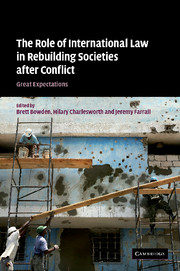Book contents
- Frontmatter
- Contents
- Contributors
- Preface
- Abbreviations
- Introduction
- 1 The ‘state-building enterprise’: Legal doctrine, progress narratives and managerial governance
- 2 Democratisation, state-building and politics as technology
- 3 International law, human rights and the transformative occupation of Iraq
- 4 Defining democracy in international institutions
- 5 Democracy and legitimation: Challenges in the reconstitution of political processes in Afghanistan
- 6 Impossible expectations? The UN Security Council's promotion of the rule of law after conflict
- 7 Legal pluralism and the challenge of building the rule of law in post-conflict states: A case study of Timor-Leste
- 8 From paper to practice: The role of treaty ratification post-conflict
- 9 Selective universality? Human-rights accountability of the UN in post-conflict operations
- 10 ‘Security starts with the law’: The role of international law in the protection of women's security post-conflict
- 11 Grappling in the Great Lakes: The challenges of international justice in Rwanda, the Democratic Republic of Congo and Uganda
- Conclusion: Hope and humility for weavers with international law
- Select Bibliography
- Index
3 - International law, human rights and the transformative occupation of Iraq
Published online by Cambridge University Press: 31 August 2009
- Frontmatter
- Contents
- Contributors
- Preface
- Abbreviations
- Introduction
- 1 The ‘state-building enterprise’: Legal doctrine, progress narratives and managerial governance
- 2 Democratisation, state-building and politics as technology
- 3 International law, human rights and the transformative occupation of Iraq
- 4 Defining democracy in international institutions
- 5 Democracy and legitimation: Challenges in the reconstitution of political processes in Afghanistan
- 6 Impossible expectations? The UN Security Council's promotion of the rule of law after conflict
- 7 Legal pluralism and the challenge of building the rule of law in post-conflict states: A case study of Timor-Leste
- 8 From paper to practice: The role of treaty ratification post-conflict
- 9 Selective universality? Human-rights accountability of the UN in post-conflict operations
- 10 ‘Security starts with the law’: The role of international law in the protection of women's security post-conflict
- 11 Grappling in the Great Lakes: The challenges of international justice in Rwanda, the Democratic Republic of Congo and Uganda
- Conclusion: Hope and humility for weavers with international law
- Select Bibliography
- Index
Summary
Introduction
This chapter examines the project of transformative occupation undertaken by the United States and its allies following the invasion of Iraq in 2003. More specifically, it considers the US occupation in light of two competing sensibilities in international legal argument. On one view, which I term ‘legal formalism’, the purpose of international law is eclectic, intersubjective and value-pluralist: to create the conditions for peaceful coexistence between different political orders and ways of life. This view is commonly associated with the liberalism of the United Nations (UN) Charter, which posits both the subject of international law and its liberty in formal terms as ‘the state’ and ‘sovereign equality’ respectively. On a rival view, which I term ‘instrumental anti-pluralism’, the purpose of international law is to project a universal regime based on a rationally reconstructed and universally authoritative morality. Here the identity of the sovereign as a subject of international law is understood in material terms as ‘the liberal democratic state’ and sovereignty is understood as the equal treatment of legal subjects so defined.
The defining feature of the anti-pluralist view is the notion that the internal characteristics of a state determine its standing in the family of nations. Undemocratic, illiberal, or so-called ‘rogue’ states such as Iraq are not to be regarded as full members of international society and are seen to lie outside of the zone of law.
- Type
- Chapter
- Information
- The Role of International Law in Rebuilding Societies after ConflictGreat Expectations, pp. 64 - 89Publisher: Cambridge University PressPrint publication year: 2009
- 2
- Cited by

